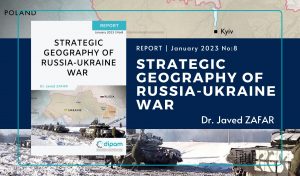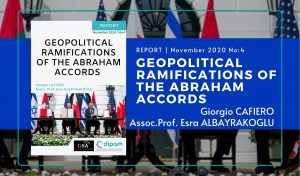The end of the Cold War, with the dissolution of the Union of Soviet Socialist Republics (USSR), was interpreted by the international community as the backbone of an upcoming peace and stability environment. However, the disputes, internal conflicts and wars that took place in the post-Cold War period quickly showed that this idea was a mistake. In this context, we can say that the Cold War created a great ideological threat in international politics that could not be left unresponsive, and in the presence of a such threat of this magnitude; ethnic, religious and social conflicts between states were temporarily put on the back burner. So that, the period after 1990 witnessed the return of ethnic and religious conflicts between societies and the rearrangement of the world political map with new border changes. As a result, it can be said that the actors of international system were in search of a new identity and so, the period came with an environment of uncertainty. Searching a geography that is not negatively affected in this new world system would be looking for a needle in a haystack, but if we talk about the most affected regions, the Balkans were on the top of the list. The bloody dissolution of Yugoslavia opened wounds that are still effective and created deep-rooted hostilities between the states in the region. Perhaps the most important example of these hostilities was the conflicts between Serbia and Kosovo based on ethnicity and border security. This conflict, which has remained hot as one of the most important problems in Balkans politics for years, is built on the failure to share Kosovo between Serbs and Kosovo Albanians, and both nations claim that they have historical rights in the region.
The Kosovo issue is a problem that threatens the security and stability of the entire Balkans. If we examine the geographical importance of the region called Kosovo, we will see that it is in the middle of the Balkans, at a point that can be called its heart. Therefore, it can be said that these lands are not only important for commercial activities in the Balkans, but also a connection point between the continents. Thus, the geographical region of Kosovo has maintained its importance throughout history due to its potential as an energy corridor and as an intercontinental cultural and trade bridge. That is why the long-standing hostility of two nations in the heart of the Balkans endangers the welfare and security of all Balkan peoples. This hostility between Serbs and Kosovo Albanians did not only stop there, but also disturbed their geographical neighbors: the European states. Moreover, Russia’s efforts to gain benefits within the framework of its historical plans in the region and the subsequent entry of the USA into the equation to balance Russia have added a political dimension to the conflict, making it unresolvable. As one can understood, over time, the resolution of the dispute between Serbia and Kosovo has become a responsibility and necessity of the international community. However, as in every conflict between nations, the foundations of the dispute must first be understood.
In this context, the main purpose of the report is to provide a short but comprehensive guide explaining all the lines of the disagreement to those who want to learn about the conflict between Serbia and Kosovo. It can be said that the framework to be followed while doing this can be useful both in covering historical developments and the factors affecting current politics. So much so that, in the first part of the report, the historical background of the conflict between the two nations is discussed starting from the 1389 Ottoman rule to the 1999 NATO’s Kosovo Intervention. In the second part, the NATO Intervention, which has led to many discussions in the discipline of international relations, is examined under a separate heading, including the peacekeeping international organizations such as the United Nations Interim Administration Mission in Kosovo (UNMIK) and the NATO-led Kosovo Force (KFOR). The third chapter includes an examination of Kosovo’s independence, an event that has a destabilizing effect in contemporary Balkan politics, in the context of its history and international recognition. It would not be wrong to say that the main mediator role in the Serbia-Kosovo dispute is the European Union. Therefore, the importance of this normalization process, which is being carried out under the leadership of the EU, deserves to be examined under a separate heading, in the fourth chapter. Then, in the fifth chapter, the roles of Russia, the USA, the EU and Turkey in regional politics were examined, as reading the current Serbia-Kosovo problem only through these two states would neglect the role of external actors in the Balkans. Finally, the report concluded by examining the problems that occupy contemporary Serbia and Kosovo politics and explaining the fate of the conflict between the two nations in an objective scheme.
Table of Contents
- Introduction
- 1. Historical Background
- 2. NATO’s Humanitarian Intervention in Kosovo
- 3. Kosovo’s Declaration of Independence
- 4. Dialogue Process Under The Supervision of The European Union
- 5. Key International Actors in The Course of The Conflict
- a. European Union (EU)
- b. United States (US)
- c. Russia
- d. Türkiye
- 6. Contemporary Issues in the Serbia-Kosovo Conflict
- Conclusion









